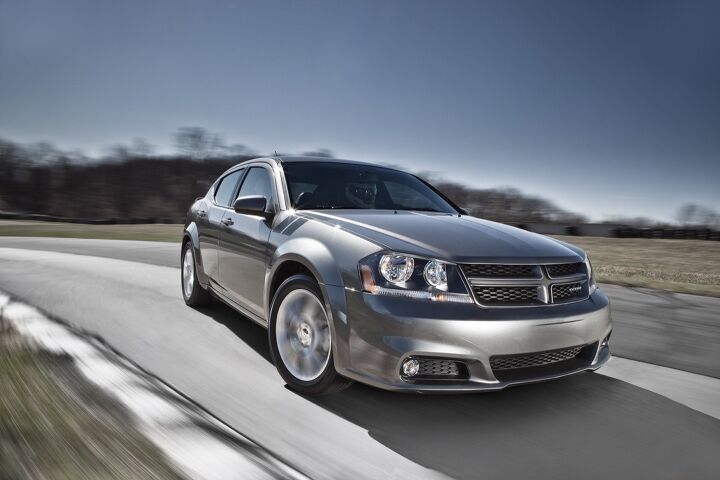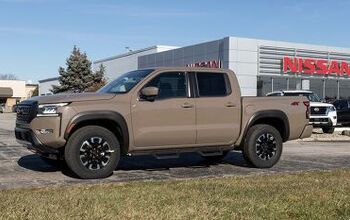Midsize Sedan Deathwatch #14: July 2017 Sales Plunge by a Fifth, Everybody Falls Except the Dodge Avenger
Every midsize car on sale in the United States reported declining year-over-year volume in July 2017. Every car except the Dodge Avenger, which came back from the dead with 10 reported sales after a nine-month hiatus. 2014 was the Avenger’s last model year.
But forget that sales stat quirk — Pentastar Avenger Blacktop Edition, be still my soul. Every other midsize nameplate generated fewer sales in July 2017 than July 2016, with losses piling up fastest at Ford and Hyundai, with the Fusion and Sonata, respectively.
Between major Fusion and Sonata losses and decreased volume everywhere else, U.S. midsize car volume fell by a fifth in July 2017 — a 36,000-unit decline.
This is the fourteenth edition of TTAC’s Midsize Sedan Deathwatch. The midsize sedan as we know it — “midsizedus sedanicus” in the original latin — isn’t going anywhere any time soon, but the ongoing sales contraction will result in a reduction of mainstream intermediate sedans in the U.S. market.
How do we know? It already has.
As automakers claim, en masse, to be resisting the appeal of easy fleet volume, the midsize segment that has historically helped fill rental car lots is suffering particularly sharp losses in 2017’s retail-only quest. Consider that in the 2016 calendar year, Ford Motor Company, Fiat Chrysler Automobiles, and General Motors generated 29 percent, 24 percent, and 20 percent of their U.S. sales via fleet. In July 2017, those figures fell to 20 percent, 10 percent, and 11 percent, respectively.
Pair reduced fleet efforts with reduced retail demand — and at Hyundai, a transition phase into a refreshed model — and the result is a 48 percent drop to only 10,648 sales for the Sonata. Hyundai’s share of the midsize market fell to 7.3 percent in July 2017 and is down to 8.2 percent (from 9.7 percent in 2016) so far this year.
The Ford Fusion’s July decline was similarly harsh. The 42 percent drop to 13,886 sales represented the lowest-volume month for the Fusion since October 2012. Fusion sales are down by nearly a third so far this year, which means Fusion sales are 50,000-units weaker this year than last.
Incidentally, the most inconsequential decline in the midsize category in July 2017 belonged to the best-selling midsize car: Toyota’s Camry. With the launch of the all-new 2018 Camry underway, Toyota sold 33,827 Camrys in July 2017, a modest 1-percent decrease compared to July 2016. Unfortunately for Toyota, that wasn’t enough for the Camry to be America’s best-selling car last month. The best seller’s crown was worn by the Honda Civic, sales of which jumped 11 percent.
Yes, while every midsize car in America reported declining sales in July, there were cars, such as the Civic, that managed to report improvements, even as the U.S. auto industry slid 7 percent. The midsize segment’s 20-percent slide was substantially worse than the car sector’s 15-percent drop. Indeed, if midsize cars are excluded, the U.S. passenger car sector was down “only” 13 percent. Compact car volume, meanwhile, was down just 5 percent in July and year-to-date.
According to Kelley Blue Book, midsize car average transaction prices slid 0.4 percent, year-over-year, to $24,852 in July 2017. Compact car ATPs rose 1.3 percent to $20,403.
[Image: Fiat Chrysler Automobiles]
Timothy Cain is a contributing analyst at The Truth About Cars and Autofocus.ca and the founder and former editor of GoodCarBadCar.net. Follow on Twitter @timcaincars.
More by Timothy Cain
Latest Car Reviews
Read moreLatest Product Reviews
Read moreRecent Comments
- W Conrad I'm not afraid of them, but they aren't needed for everyone or everywhere. Long haul and highway driving sure, but in the city, nope.
- Jalop1991 In a manner similar to PHEV being the correct answer, I declare RPVs to be the correct answer here.We're doing it with certain aircraft; why not with cars on the ground, using hardware and tools like Telsa's "FSD" or GM's "SuperCruise" as the base?Take the local Uber driver out of the car, and put him in a professional centralized environment from where he drives me around. The system and the individual car can have awareness as well as gates, but he's responsible for the driving.Put the tech into my car, and let me buy it as needed. I need someone else to drive me home; hit the button and voila, I've hired a driver for the moment. I don't want to drive 11 hours to my vacation spot; hire the remote pilot for that. When I get there, I have my car and he's still at his normal location, piloting cars for other people.The system would allow for driver rest period, like what's required for truckers, so I might end up with multiple people driving me to the coast. I don't care. And they don't have to be physically with me, therefore they can be way cheaper.Charge taxi-type per-mile rates. For long drives, offer per-trip rates. Offer subscriptions, including miles/hours. Whatever.(And for grins, dress the remote pilots all as Johnnie.)Start this out with big rigs. Take the trucker away from the long haul driving, and let him be there for emergencies and the short haul parts of the trip.And in a manner similar to PHEVs being discredited, I fully expect to be razzed for this brilliant idea (not unlike how Alan Kay wasn't recognized until many many years later for his Dynabook vision).
- B-BodyBuick84 Not afraid of AV's as I highly doubt they will ever be %100 viable for our roads. Stop-and-go downtown city or rush hour highway traffic? I can see that, but otherwise there's simply too many variables. Bad weather conditions, faded road lines or markings, reflective surfaces with glare, etc. There's also the issue of cultural norms. About a decade ago there was actually an online test called 'The Morality Machine' one could do online where you were in control of an AV and choose what action to take when a crash was inevitable. I think something like 2.5 million people across the world participated? For example, do you hit and most likely kill the elderly couple strolling across the crosswalk or crash the vehicle into a cement barrier and almost certainly cause the death of the vehicle occupants? What if it's a parent and child? In N. America 98% of people choose to hit the elderly couple and save themselves while in Asia, the exact opposite happened where 98% choose to hit the parent and child. Why? Cultural differences. Asia puts a lot of emphasis on respecting their elderly while N. America has a culture of 'save/ protect the children'. Are these AV's going to respect that culture? Is a VW Jetta or Buick Envision AV going to have different programming depending on whether it's sold in Canada or Taiwan? how's that going to effect legislation and legal battles when a crash inevitibly does happen? These are the true barriers to mass AV adoption, and in the 10 years since that test came out, there has been zero answers or progress on this matter. So no, I'm not afraid of AV's simply because with the exception of a few specific situations, most avenues are going to prove to be a dead-end for automakers.
- Mike Bradley Autonomous cars were developed in Silicon Valley. For new products there, the standard business plan is to put a barely-functioning product on the market right away and wait for the early-adopter customers to find the flaws. That's exactly what's happened. Detroit's plan is pretty much the opposite, but Detroit isn't developing this product. That's why dealers, for instance, haven't been trained in the cars.
- Dartman https://apnews.com/article/artificial-intelligence-fighter-jets-air-force-6a1100c96a73ca9b7f41cbd6a2753fdaAutonomous/Ai is here now. The question is implementation and acceptance.



































Comments
Join the conversation
There is not doubt that these cars are declining in popularity. The popular explanation is the rise of crossovers which is too obvious to mention. (Although it would be worth some investigating as to how much of this is real consumer preference and how much is the tail wagging the dog as automakers are happier with the CAFE implications of selling more "trucks.") Regarding mid-size sedans in particular, it's also worth noting how large these cars have become over the years. A 2017 Civic is probably a more useful family car than a 1997 Accord. Some families used to need a mid-sizer whereas, now many families can get by with a "compact" sedan.
At some point we need to adjust our vocabulary. The small SUV or CUV is now the default "family sedan". What we now call a "sedan" is a specialty vehicle, a low to the ground sporty version of a family sedan, maybe a "sport sedan".